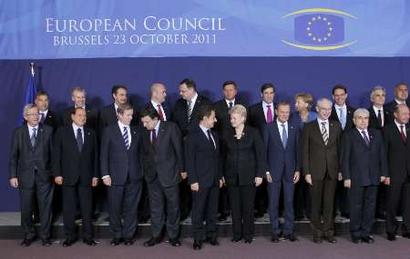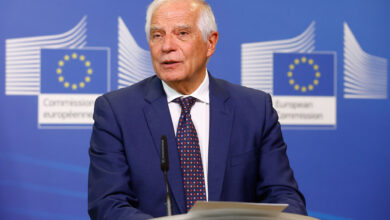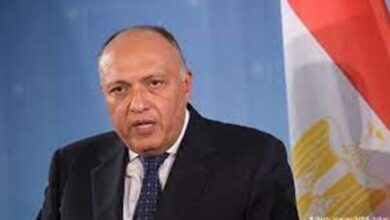
BRUSSELS — When they meet Thursday and Friday in Brussels, leaders of the 27 countries in the European Union will face a daunting task: Find a solution to a debt crisis that's spread misery across Europe, raised doubts about the euro currency, rattled investors and threatened global growth.
Investors have driven up interest rates on Spanish and Italian debt to unsustainable levels, raising the risk those big countries will need a bailout the rest of Europe can't afford. Unemployment in the 17 countries that use the euro is 11 percent, the highest since the euro was adopted in 1999.
A US$125 billion plan to bail out Spanish banks has failed to calm financial markets. Even an election that brought a pro-euro-alliance Greek government to power failed to reassure investors that Greece would continue to pay its bills, keep using the euro and avoid a financial crackup that could set off a worldwide panic.
The EU leaders will consider plans to:
—Tackle Europe's government debt problems.
— Fix Europe's banks.
— Help Greece.
— Stimulate Europe's sluggish economy.
Still, any proposals that might be approved at the summit may not be bold or fast enough to turn back the threats closing in on Europe. And Germany, wary of being stuck with the bill for a rescue plan, might veto the ideas first.
"We're seeing faster movement on the policy front," says Barry Eichengreen, an economist at the University of California, Berkeley. "The problem is, the crisis doesn't wait."
Here's a look at the more ambitious ideas policymakers are considering:
Tackling debt
The worldwide financial crisis and the recession that followed ripped a hole in the budgets of many European governments, leaving them with huge debts. Greece's government debt now equals 165 percent of annual output; in Italy, it's 120 percent; in Ireland, 108 percent.
Economists say anything above 90 percent saps an economy's health. Bond investors, worried about the debt, are demanding higher interest rates. The result is that many countries' borrowing costs have reached unsustainable levels. Ireland, Portugal and Greece have already needed bailouts to pay their bills. Spain is receiving a loan to save its banks, and on Tuesday its borrowing costs soared in a pair of short-term auctions. Cyprus this week became the fifth European country to request a bailout.
Bailout money could run short if big countries like Italy need rescues, too. European leaders are expected to consider several ideas in Brussels:
— Spreading some of the weak countries' debt loads to stronger countries that also use the euro. Alexander Hamilton, America's first Treasury secretary, did something similar in the 1790s. He had the US government absorb the debts the 13 original states ran up fighting the American Revolution.
The 17 countries that use the euro could issue jointly guaranteed "eurobonds," sharing responsibility for the weakest countries' debts. These bonds could carry low interest rates because they'd be backed by the collective power of all the eurozone countries, including Germany. Or excessive government debts — anything beyond 60 percent of a country's output — could go into a "European debt redemption fund," guaranteed collectively and paid down over 20 to 25 years. Because the redemption fund would be a one-time move, it might be more palatable to Germany than a long-term eurobond plan.
—Handing power to a centralized eurozone budget authority to demand changes in individual countries' taxing and spending plans if they break budget rules. This idea goes beyond earlier calls for budget limits on eurozone countries. It was proposed on the eve of the summit by key European leaders.
—Tapping the $625 billion available from the eurozone's two bailout funds to buy government bonds on the open market. These purchases would drive the prices of the bonds up and the interest rates, or yields, on them down. That would help countries like Italy and Spain when they have to sell bonds to finance their deficits or replace maturing bonds.
Fixing banks
Europe doesn't just have a government debt crisis. It has a banking crisis, too. A collapse in housing prices buried Spanish and Irish banks in bad real estate loans. To rescue its banks, Ireland's government needed a $106 billion bailout. Now Spain needs a $125 billion loan from the rest of the eurozone to rebuild its banks' capital — their defense against losses. At the same time, banks across Europe have been the biggest buyers of their governments' bonds. So as yields have surged and the bonds have declined in value, banks have suffered losses.
Finally, Europe faces the risk of banks runs: Greek depositors are withdrawing money from banks because they fear Greece will stop using the euro. If that happened, their savings would be devastated as their deposits were shifted from euros into Greek currency worth perhaps half as much. Bank runs could spread if depositors elsewhere worried that their countries might also abandon the euro.
So the EU is considering a banking overhaul. Among the ideas:
—The European Commission, which writes laws and regulations for the EU, has proposed a deposit insurance fund to protect savers across the EU the way the Federal Deposit Insurance Corp. guarantees up to $250,000 per account in the US. Individual European countries now insure bank deposits within their borders. But bank failures could overwhelm those national funds.
—The European Commission has suggested establishing a Europe-wide banking union, policed by a centralized regulator. Europe now lacks a single regulator with authority to force weak banks to build more capital or to break them apart. National regulators have been reluctant to shut down weak banks.
"No national government wants to lose control over their banks," says Jacob Kirkegaard, research fellow at the Peterson Institute for International Economics. "But that is, of course, precisely what is required if you want to have a European banking union."
—The Spanish bank bailout has raised fears that Spain's government couldn't afford to repay its $125 billion eurozone loan. Some analysts say the solution is to rethink the bailout: Instead of lending money to Spain, pump it directly into Spanish banks and take an ownership stake in them. That's how the US Treasury fixed the US banking system after Lehman Brothers collapsed in 2008. Congress approved the $700 billion Troubled Asset Relief Program, or TARP, and the money was used to strengthen bank capital. Most of the money has been repaid with interest, and the cost to US taxpayers has been minimal.
Easing up on Greece
The coalition government that emerged from Greece's 17 June election has said it's willing to make the painful budget cuts required under a bailout deal agreed to in March. Greek voters chose that approach over a government that would have rejected the bailout and likely led Greece out of the eurozone. But the new government wants more time. If Greece isn't granted more time and fails to meet the targets, the EU, the European Central Bank and the International Monetary Fund will have to decide whether to withhold further installments of bailout money.
Without the money, Greece would default on its debts and probably stop using the euro. But Germany is resisting efforts to go easy on the Greeks. Greece spent recklessly, delayed reforming its economy and for years misled the rest of the world about its precarious finances. It's now struggling with 22 percent unemployment.
Stimulating growth
Everyone agrees Europe needs growth, which would help troubled countries pay their bills. Leaders of France, Germany, Italy and Spain agreed last week to push for a growth package worth up to $163 billion. But the plan is relatively modest. The money is expected to consist mostly of European funds already earmarked for development.
Analysts worry that most of the proposals to aid Europe would take too long to work. The European Commission's banking plans wouldn't take full effect until 2018 — not soon enough to calm depositors in troubled Spanish banks or allay fears of a banking crisis. And there might not be enough bailout money to back more than $3.1 trillion in combined Italian and Spanish debt.
Some analysts want to see the ECB act more aggressively. They want the central bank to pump money into the financial system by lowering short-term rates and buying bonds to push down long-term rates as the US Federal Reserve has done. But Germany worries that aggressive action by the ECB would unleash inflation.
As the eurozone's largest economy, accounting for more than a quarter of its output, Germany is strong enough to support its weaker neighbors. But German taxpayers fear being stuck with a disproportionate share of the bill for bailouts.
To ease that concern, top European officials have urged eurozone countries to yield more control over their national budgets. The plan is meant as a grand vision to save the euro and set up negotiations at this week's summit.
Economist Jonathan Wright at Johns Hopkins University says he worries that leaders will take "at best half- or quarter-steps" this week. He favors aggressive action by the ECB and a TARP-style rescue of the banking system.
"The measures that are needed are very radical," Wright said.




